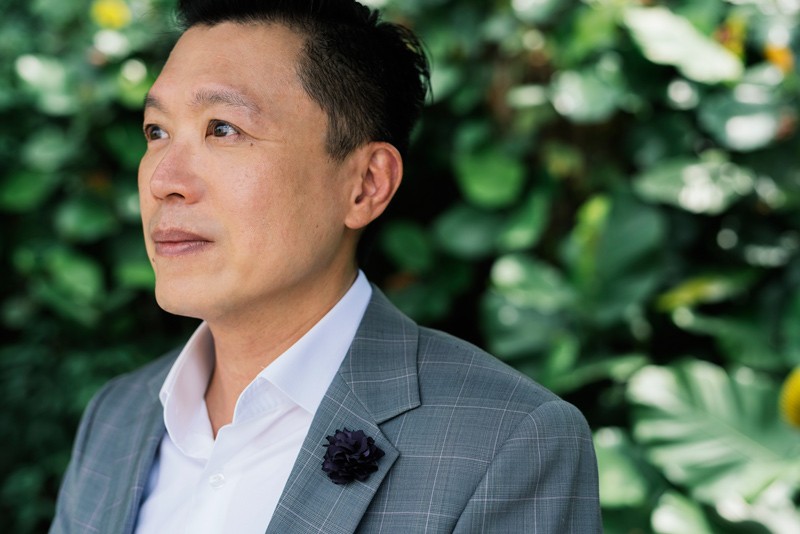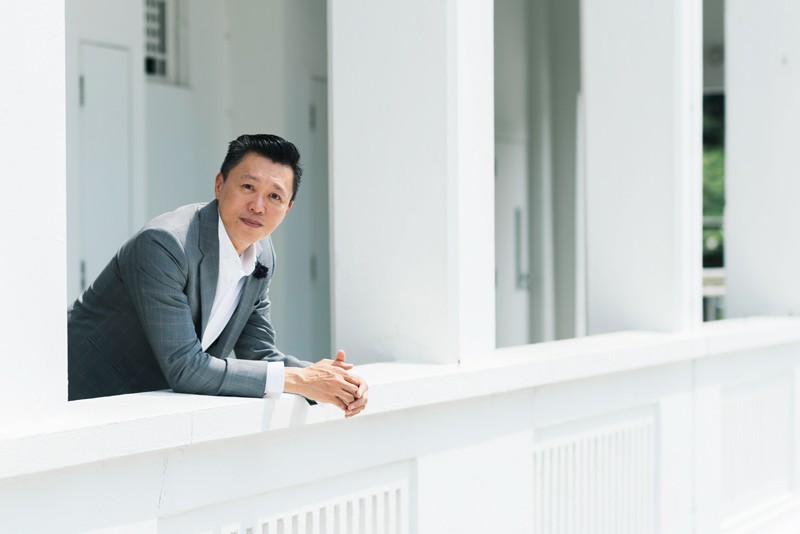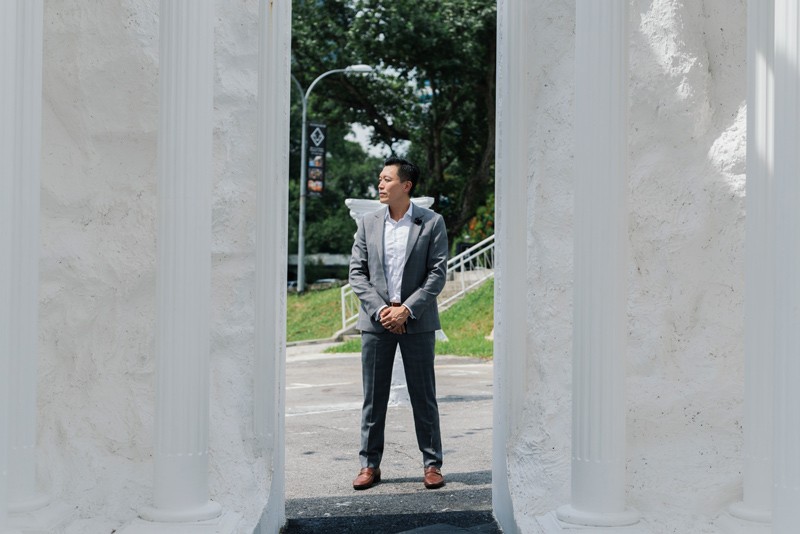I certainly don’t wish to be in Lim Tian Wee’s position right now. The man is standing under the blazing midday sun, posing in his well-tailored grey suit as our photographer calls out to him. Tian Wee is doing his best to keep stock-still and perspiration-free, but he seems to be losing the battle against the heat. As he reaches for his handkerchief to wipe away large beads of sweat on his forehead, he remarks, “In interviews like this, people only see a snippet of the story: Lim Tian Wee in a suit, looking like a symbol of success. Nobody sees the behind-the-scenes. . . me alone in the factory with my sleeves rolled up, sweating away while blending teas.” I have to give it to Tian Wee for being a real trooper. He soldiers on through the sweltering heat and is forthcoming during the course of our interview—over what else, but cups of fragrant Gryphon tea. The 47-year-old helms a homegrown tea company which he founded in 2005 with a capital sum of $2,000. Today, the business earns a healthy six-figure sum in annual revenue, with a thriving online clientele plus outlets and distribution in over 14 countries worldwide. In spite of Tian Wee’s family background (a fourth generation tea packing business and distributorship started by his great grandmother), this success has not come without struggles and sacrifices. Single-handedly, Tian Wee has managed to pull through challenging times, despite countless rejections at the start when reluctant buyers weren’t keen on what he had to offer. I ask how he coped, and he says, “Nobody should affect how you feel because ultimately, our greatest battle is with our own self.” Last year, Gryphon Tea Company celebrated its 10th anniversary with the launch of Monogram, a set of bespoke teas catering to an increasingly sophisticated audience. There are plans for a full-service café in late 2017—serving up Gryphon teas with a refreshing twist of fresh botanicals and herbs—a dream that has been a long-time coming for Tian Wee. It’s apparent that stamina and patience are his strongest suit, and like the best long-distance runners, he has his eyes set on the next race. “A while back, someone was telling me that life is short. Don’t spend it doing the same things over and over again. I’m in the tea business now, but going forward, in the next 10, 15 to 20 years, I hope to be doing something else.”
Conversations with Lim Tian Wee
TEO REN FENG: You’ve mentioned that people are often surprised by how a Singapore company can produce good tea.
LIM TIAN WEE: Yes! I always get such remarks when we present our tea to overseas customers. Sometimes it is a passing comment like, “Oh, I didn’t know Singapore has tea.” I see that as an opportunity to wow them with our ideas and concepts, and show them that Singapore companies can be really creative. America doesn’t have coffee, but look what they’ve done with it.
REN FENG: So it doesn’t matter if we are not a tea-producing nation.
TIAN WEE: Being in Singapore has given us the opportunity to be very experimental in the way we present our ideas. Although we drink tea, we don’t have a tea manufacturing background, so we’re not held back by a lot of traditions. Certain markets like Japan, for example, have traditions that are weighing them down and preventing them from moving forward. Why isn’t Starbucks from Italy or from a coffee-producing nation in South America or Africa? They were able to start a new café culture because they didn’t have a legacy.
REN FENG: They had room to reinterpret?
TIAN WEE: Yes—without being judged.
REN FENG: You’ve created teas from unusual ingredients such as bonito fish flakes and curry leaves. Where do you take inspiration from?
TIAN WEE: Many ideas actually come from daily experiences. Whenever I go for a jog at the Botanic Gardens, I like to smell the flowers, and I often get strange looks for doing that. My travels inspire me, too. I was in Florence last year, and Italy is famous for bergamot. My hotel compound had a lot of orange flowers, which we don’t get in Singapore. So every day, I would try to register the scent in my memory because I wanted to inject that flavour and note into our earl grey tea, whilst staying true to the natural scent of bergamot. Eventually, that ended up being our Earl Grey Neroli tea.
Since we are a small business, we cannot afford to make too many mistakes.
REN FENG: You pay such close attention to detail—are you a perfectionist?
TIAN WEE: I hesitate to say yes because it sounds bad, but I like everything to beautiful and perfect. My wife is always telling me, “Tian Wee, you like nice things…” And I will agree, because that’s the reason why I married her, right? [Laughs] Since we are a small business, we cannot afford to make too many mistakes. Mistakes will happen, no doubt, but we cannot afford to repeat them.
REN FENG: How high are your standards for Gryphon Tea then?
TIAN WEE: For me, “perfection” stands at 90%. To achieve 100% would take up too many resources.
REN FENG: Why did you start Gryphon Tea?
TIAN WEE: When I started the company, I just wanted to have a tea brand. We decided to call it Gryphon Tea because my father had drawn a logo, which I thought looked like a griffin, but actually turned out to a dragon instead. But more than the logo, it was about creating a legacy for him. Having a retail business was an unfulfilled dream of my father’s, and now that he has given me the means and foundation to achieve it, I wanted to make him proud. He’s been very happy with what we’ve achieved so far.
REN FENG: Why did you choose not to join your family business immediately after graduating?
TIAN WEE: Because my dad didn’t want me! He said that I was of no value to him because I had no business experience. My first job was working for Unilever, where I was exposed to the workings of a multi-national corporation. That helped me understand sales, channel development and marketing on a deeper level, so I’ve got to thank my father for his decision.
REN FENG: I understand that you started the business in 2005 with a very small sum of $2,000.
TIAN WEE: Yes, and even though I started with a small capital, the success of my plan also depended on the fact that my family’s business was in tea too—that definitely helped in terms of production.
REN FENG: How much was Gryphon Tea’s revenue last year?
TIAN WEE: Around $5.8 million.
REN FENG: So that’s doubled in the last two years?
TIAN WEE: Past three years.
REN FENG: What’s in store for Gryphon Tea now?
TIAN WEE: Our next challenge is to have greater production capacity and be a larger player in the market where we not only support F&B operators, but other tea companies as well. We hope smaller tea companies can grow with us too because when I look at other Asian tea businesses, such as those in Korea, Taiwan and Japan, there is always a collaborative effort. Companies help each other despite the fact that they are competing in the same industry. Singaporean companies don’t do that. They don’t think: Hey, both you and I are doing tea—why don’t we work together to create something bigger? It’s something that I yearn for—collaborative partners, big or small.
REN FENG: What would your definition of success be for Gryphon Tea?
TIAN WEE: I hope to be the largest tea brand in Asia—that would be the benchmark of success for us.
If we keep looking at others, we’re only going to end up looking like them.
REN FENG: What actions have you taken to secure the future of your company?
TIAN WEE: Well, we never look at our competitors. We don’t care about what they’re doing, and it’s not because we are being arrogant. If we keep looking at others, we’re only going to end up looking like them. Just like certain pets and their owners. [Laughs] The future is ahead. I’d rather look forward and see where I’m driving towards, than to keep looking in the rear view mirror and miss the dangers up ahead. I don’t like having brand taglines like, “Driven by Passion” or whatever, because while you can tell people that you are passionate, what’s more important is letting your work speak for itself.
REN FENG: Is there still room in the local tea market for newer players?
TIAN WEE: I welcome young entrepreneurs who are looking for advice to start a tea business. I like to quote Anton Ego, the food critic in Ratatouille. He said, “Anyone can be a great artist”, and I think it is true that a great artist can come from anywhere. As long as you have passion for what you do, and you persevere, you’ll be able to make something of it.
REN FENG: Are the barriers to entry different now than when you first began?
TIAN WEE: Yes. There are more international brands in the market now, which poses a threat to smaller companies. An Australian brand called T2 is coming into Singapore, and T2 belongs to a larger company that was acquired by Unilever. As a company, T2 will have access to a much larger resource pool, and if you’re a start-up or a smaller player, you might find difficulty competing in terms of price, variety and even marketing support. Still, there are always opportunities where there are challenges. That was how Charles & Keith was created. You just need to find that niche to position yourself.
People liken the journey of entrepreneurship to running a marathon. But the problem is I can’t ever see the finish line.
REN FENG: 2008 was a turning point for the company’s business. Did you have a particular moment when you realised that you had a chance to succeed?
TIAN WEE: It never crossed my mind—in fact, sometimes I still wonder why I got myself into this. People liken the journey of entrepreneurship to running a marathon. But the problem is I can’t ever see the finish line. Our government just announced that they will be extending the retirement age, and I told my wife that I will be working till I am 75. [Laughs]
REN FENG: What keeps you going then?
TIAN WEE: What drives me is knowing that when I wake up every morning, I am going to make a difference to the business. That excites me. We own our own destinies, according to what we do. It’s really not about the monetary rewards. I get satisfaction when customers or people I meet, tell me how much they've enjoyed the quality and flavour of our teas. Their validation gives me fuel to carry on.
REN FENG: Didn’t you survive on a monthly income of $1,000 when you first joined the family business?
TIAN WEE: Yes, but my wife helped me out too.
REN FENG: How long were you on that income for?
TIAN WEE: Slightly over a year. In fact, I only got an increment after asking for one because they actually forgot about it. [Laughs] I was getting married and needed the money.
REN FENG: Was the reduced salary and your experience learning to dress down for work at your family’s company a humbling experience for you?
TIAN WEE: It was. I had to give up wearing a shirt and tie to work. I remember going into office the first day without my usual corporate attire... and I felt... Lost? As though I was taking a few steps back in life. It took me awhile to adjust my pride and I had to do quite a lot of that in the first year.
REN FENG: Any regrets choosing this path?
TIAN WEE: I have had no regrets; though if you ask me now if I would want to redo it—probably not. It’s tiring. As an entrepreneur, you have to make a lot more sacrifices. The only vacations I take are 1 or 2 days off after a work trip, or at my wife’s insistence. There is always work on my mind—even as we are talking, I have an idea stewing already. I guess I eat, live and breathe my business. That keeps me moving, and I understand now why many business owners continue working in their seventies—they find value and meaning in what they do, and that gives them a sense of purpose.
REN FENG: Do you think entrepreneurship is really about wanting to be in control of your destiny?
TIAN WEE: Recently, I watched a video by Jack Ma who is one of my heroes. He said, “Entrepreneurs are not the smartest people around. If you’re a smart person, you’d be working in the civil service.” You’d be a scholar, right? So, entrepreneurs might not be the smartest people around, but they are certainly the most stubborn. They’re willing to work hard. I attribute my success to working hard, but also the ability to endure setbacks and still remain positive.
It’s important to celebrate the small wins.
REN FENG: Can you tell me more about that?
TIAN WEE: This journey is more often than not, a lonely one. When you first start out, you are a ‘nobody’, and no one will listen to you or give you their time. You face and solve problems on your own, and if you have no network and are not born with a silver spoon in your mouth, you struggle to meet the right people. It’s hard and being able to persevere through all of that is important because it helps to build character. Ultimately, no matter what, there is always going to be a silver lining. One is never down all the time—there’s always going to be an upside.
REN FENG: Any advice to new entrepreneurs?
TIAN WEE: It’s important to celebrate the small wins. I find that young people tend to be very impatient. They want to be an entrepreneur and start their own business, and immediately expect to have a big win. But by and large, big wins are hard to come by. Small wins are easier to achieve, so gather the small wins and use them as fuel for your entrepreneurship journey. That’s how I’ve survived for the past 10 years.
REN FENG: That’s very meaningful.
TIAN WEE: Yeah. It comes from the heart.
REN FENG: You seem to be fond of the Pixar animation movie, Ratatouille.
TIAN WEE: Yes. It’s my favourite animation of all time. I have a collection of movies about food and animation. I enjoy Ratatouille because of its attention to detail. The kitchen in the French restaurant was so meticulously put together… it is truly my dream kitchen!
REN FENG: In Ratatouille, Anton Ego’s food review claims that the world is often unkind to new talent and new creations. Do you agree?
TIAN WEE: I believe in focusing on yourself. I think you should always believe in what you do because there will always be somebody out there who will appreciate it. Put your heart and soul into your work. Do your best, so that even if you fail, you will have no regrets. That’s what we always tell children right? I live by those words.
****
Edited by Wy-Lene Yap




